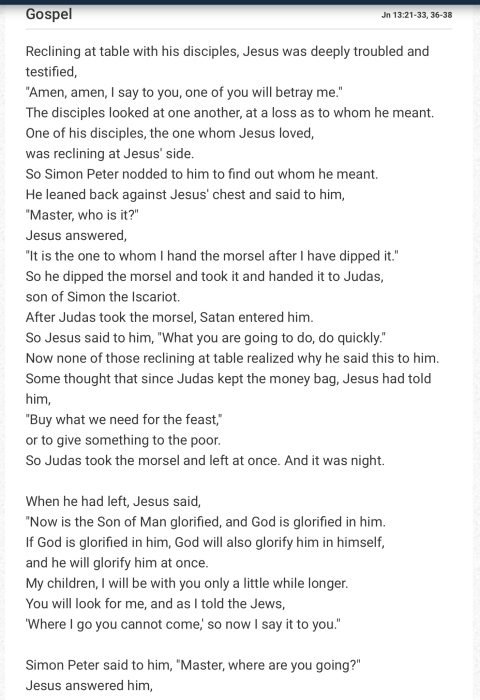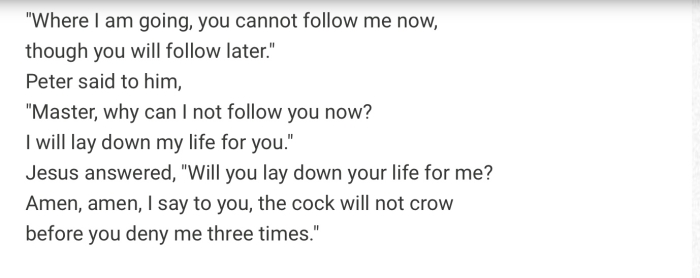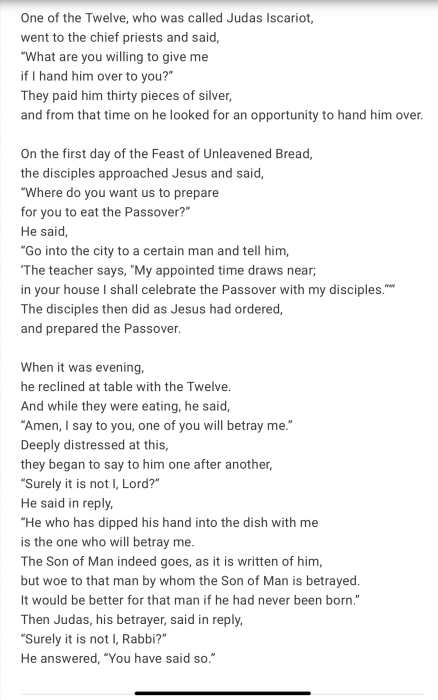Pope Francis, Catholics, and Christians in the news worldwide
ah yes, free will. the religionist's loophole for why the omnipotent god allows evil.
mtierney said:
... Unfortunately free will keeps the Devil in business.
drummerboy said:
well, no.
choosing to believe in god requires significantly less. in fact, thought gets in the way.
Under your theory Ayn Rand was a much more thoughtful person than Dorothy Day, and I'm going to have to disagree with you about that.
drummerboy said:
ah yes, free will. the religionist's loophole for why the omnipotent god allows evil.
mtierney said:
... Unfortunately free will keeps the Devil in business.
"If God existed then there wouldn't be free will" is not a very thoughtful assertion.
There's even a field of thought that discusses the whole issue - "Theodicy".
nohero said:
drummerboy said:
well, no.
choosing to believe in god requires significantly less. in fact, thought gets in the way.
Under your theory Ayn Rand was a much more thoughtful person than Dorothy Day, and I'm going to have to disagree with you about that.
no - I'm only talking about the thought required to arrive at the conclusion that there is no evidence for god as opposed to saying "I have no idea, therefore god." which describes where thought stops.
also, not to get too pedantic about it, but we're not talking about "thoughtful" as in "showing consideration for the needs of other people".
always important to define the terms
nohero said:
drummerboy said:
ah yes, free will. the religionist's loophole for why the omnipotent god allows evil.
mtierney said:
... Unfortunately free will keeps the Devil in business.
"If God existed then there wouldn't be free will" is not a very thoughtful assertion.
There's even a field of thought that discusses the whole issue - "Theodicy".
no, I did not say or imply "If God existed then there wouldn't be free will". It's not whether he exists but whether he's omnipotent.
yes, I'm aware of theodicy - the most pretzel-bending area of apologetics.
drummerboy said:
no, I did not say or imply "If God existed then there wouldn't be free will". It's not whether he exists but whether he's omnipotent.
yes, I'm aware of theodicy - the most pretzel-bending area of apologetics.
I'm sorry, but there's literally no basis on which to have an intelligent conversation with you on this, since you don't seem to understand some basic concepts of the debate.
drummerboy said:
nohero said:
Under your theory Ayn Rand was a much more thoughtful person than Dorothy Day, and I'm going to have to disagree with you about that.
no - I'm only talking about the thought required to arrive at the conclusion that there is no evidence for god as opposed to saying "I have no idea, therefore god." which describes where thought stops.
also, not to get too pedantic about it, but we're not talking about "thoughtful" as in "showing consideration for the needs of other people".
always important to define the terms
No, I meant "thoughtful" as in the first definition found in most dictionaries. For example, "characterized by careful reasoned thinking" in https://www.merriam-webster.com/dictionary/thoughtful.
But, fine, have it your way. Under your theory, the difference between Ayn Rand and Dorothy Day (contemporaries in NYC although so far as I know they never interacted) is that Rand engaged in "the thought required to arrive at the conclusion that there is no evidence for god as opposed to saying 'I have no idea, therefore god.' which describes where thought stops", the latter of which you say characterizes Dorothy Day.
I'm still going to have to disagree with you about that.
drummerboy said:
no - I'm only talking about the thought required to arrive at the conclusion that there is no evidence for god as opposed to saying "I have no idea, therefore god." which describes where thought stops.
Thought stopped before that description of the religious.
If only they had something as challenging as “arrive at the conclusion that there is no evidence for god” to hang their thinking caps on.
Maybe all the confusion about God is just a byproduct of religion ..
I don’t doubt the existence of a positive force in all this grand universe and beyond, I just don’t think that force is related to humans.
Now that negative force coexisting with us looks nothing like the depiction of a human form with horns and a tail, brandishing a pitch fork.
Heaven is right here, hell is right here, and the hippies were right.
DaveSchmidt said:
ridski said:
Hey now! No need to bring us into this, we're just minding our own business.
We were?
DaveSchmidt said:
drummerboy said:
no - I'm only talking about the thought required to arrive at the conclusion that there is no evidence for god as opposed to saying "I have no idea, therefore god." which describes where thought stops.
Thought stopped before that description of the religious.
If only they had something as challenging as “arrive at the conclusion that there is no evidence for god” to hang their thinking caps on.
it's very obviously more challenging. that's why there are so few of us. it's only for the strong.
drummerboy said:
it's very obviously more challenging. that's why there are so few of us. it's only for the strong.
Ladies and gents, a real live atheism apologist.
DaveSchmidt said:
drummerboy said:
it's very obviously more challenging. that's why there are so few of us. it's only for the strong.
Ladies and gents, a real live atheism apologist.
apologist - someone who speaks or writes in defense of someone or something that is typically controversial,
unpopular, or subject to criticism
yeah. so?
drummerboy said:
yeah. so?
Just arriving at another evidence-based conclusion to stay strong.
Piece of evidence for the nonexistence of God just dropped ...
Happy Holy Week! Let’s Make America Pray Again. As we lead into Good Friday and Easter, I encourage you to get a copy of the God Bless The USA Bible. @TheLeeGreenwood https://t.co/1KK5QgVK85 pic.twitter.com/XoCIeGDpAg
— Donald J. Trump Posts From His Truth Social (@TrumpDailyPosts) March 26, 2024
nohero said:
drummerboy said:
nohero said:
Under your theory Ayn Rand was a much more thoughtful person than Dorothy Day, and I'm going to have to disagree with you about that.
no - I'm only talking about the thought required to arrive at the conclusion that there is no evidence for god as opposed to saying "I have no idea, therefore god." which describes where thought stops.
also, not to get too pedantic about it, but we're not talking about "thoughtful" as in "showing consideration for the needs of other people".
always important to define the terms
No, I meant "thoughtful" as in the first definition found in most dictionaries. For example, "characterized by careful reasoned thinking" in https://www.merriam-webster.com/dictionary/thoughtful.
But, fine, have it your way. Under your theory, the difference between Ayn Rand and Dorothy Day (contemporaries in NYC although so far as I know they never interacted) is that Rand engaged in "the thought required to arrive at the conclusion that there is no evidence for god as opposed to saying 'I have no idea, therefore god.' which describes where thought stops", the latter of which you say characterizes Dorothy Day.
I'm still going to have to disagree with you about that.
not sure why you're confused about my original comment on this tangent, but I was never referring to someone's life work. I was merely talking about how one arrives at the conclusion to be atheist or theist. consequently, comparing Rand to Day on any basis other than that is a straw man.
Also, you can disagree with Rand's conclusions, but you can hardly say that she wasn't thoughtful about it. And to say that Day was more thoughtful (1st definition) than Rand is kind of baffling. What does that even mean?
If you want to make a case Day was more thoughtful than Rand using my definition of "showing consideration for the needs of other people", sure, that makes sense.
drummerboy said:
not sure why you're confused about my original comment on this tangent, but I was never referring to someone's life work. I was merely talking about how one arrives at the conclusion to be atheist or theist. consequently, comparing Rand to Day on any basis other than that is a straw man.
Your original comment was as quoted when I referenced the two of them ("choosing to believe in god requires significantly less. in fact, thought gets in the way.") -
nohero said:
drummerboy said:
well, no.
choosing to believe in god requires significantly less. in fact, thought gets in the way.
Under your theory Ayn Rand was a much more thoughtful person than Dorothy Day, and I'm going to have to disagree with you about that.
It's not a "straw man", but maybe I was assuming too much background knowledge. Dorothy Day became a Catholic at the age of 30, and from all evidence gave it more than a little thought. She put her ideals into practice with the Catholic Worker Movement and its publication, The Catholic Worker, from 1933 until her death in 1980.
As for Ayn Rand, from what I can tell Christianity and other religious belief conflicted with her philosophy of radical self-interest ("If I were a Christian, nothing could make me more indignant than that: the notion of sacrificing the ideal to the nonideal, or virtue to vice. And it is in the name of that symbol that men are asked to sacrifice themselves for their inferiors." Cite)
But Day's choice required significantly less thought, according to what you wrote.
nohero said:
drummerboy said:
not sure why you're confused about my original comment on this tangent, but I was never referring to someone's life work. I was merely talking about how one arrives at the conclusion to be atheist or theist. consequently, comparing Rand to Day on any basis other than that is a straw man.
Your original comment was as quoted when I referenced the two of them ("choosing to believe in god requires significantly less. in fact, thought gets in the way.") -
nohero said:
drummerboy said:
well, no.
choosing to believe in god requires significantly less. in fact, thought gets in the way.
Under your theory Ayn Rand was a much more thoughtful person than Dorothy Day, and I'm going to have to disagree with you about that.
It's not a "straw man", but maybe I was assuming too much background knowledge. Dorothy Day became a Catholic at the age of 30, and from all evidence gave it more than a little thought. She put her ideals into practice with the Catholic Worker Movement and its publication, The Catholic Worker, from 1933 until her death in 1980.
As for Ayn Rand, from what I can tell Christianity and other religious belief conflicted with her philosophy of radical self-interest ("If I were a Christian, nothing could make me more indignant than that: the notion of sacrificing the ideal to the nonideal, or virtue to vice. And it is in the name of that symbol that men are asked to sacrifice themselves for their inferiors." Cite)
But Day's choice required significantly less thought, according to what you wrote.
it kind of depends on what you consider to be thought. If you want that to include any mindful meanderings that are based on the flawed premise (or incredibly weak, anyway) of a god, fine. not sure if I want to accept quantity over quality in this regard though.
also, your Rand quote is meaningless since it does not encompass all of her thought on why she's an atheist.
drummerboy said:
also, your Rand quote is meaningless since it does not encompass all of her thought on why she's an atheist.
I don’t think it’s meaningless, but I agree that it doesn’t encompass all of her thought on religious belief. Much of it is even more selfish, uninformed, and based on detesting less-fortunate people.
FWIW, one of the Jewish sages in my family’s background (I’m sorry I don’t remember which one, possibly from the Middle Ages) is partially known for writing: Gd doesn’t need our acknowledgement or permission to exist.
Defining "god" seems a tricky concept. Declaring one's disbelief in something, in more than the shallowest sense, would seem to involve grappling with trying to define "god" as much as thoughtfully proclaiming belief in the same. I suspect there are as many ways of being an atheist as there are of being a theist -- and any number of positions somewhere between the poles.
PVW said:
Defining "god" seems a tricky concept. Declaring one's disbelief in something, in more than the shallowest sense, would seem to involve grappling with trying to define "god" as much as thoughtfully proclaiming belief in the same. I suspect there are as many ways of being an atheist as there are of being a theist -- and any number of positions somewhere between the poles.
I think the believer's task in defining the god they choose to believe in is quite different from the task facing the atheist. I don't see why or how defining god has much to do with evaluating evidence or lack thereof. Atheists can work with a very general, simple definition - a supernatural being that influences the universe and/or has created the universe. Pretty sure that covers every possibility. Every significant god I'm aware of shares those basic qualities.
Specific details ascribed to that god by organized religions don't really matter to the atheist, except as possible areas of criticism of religion. But critiquing the details of religion is a separate task from deciding on non-belief and is not even a requirement. OTOH, accepting/rejecting the religious details is central to believing in god. Without the details, theism is meaningless.
I've met plenty of people who identify as atheists and yet who seem to believe in something beyond the provably "natural."
PVW said:
I've met plenty of people who identify as atheists and yet who seem to believe in something beyond the provably "natural."
Exactly. I'm an atheist, but I'm not religious about it.
PVW said:
I've met plenty of people who identify as atheists and yet who seem to believe in something beyond the provably "natural."
yeah, that includes me too, though what "believe" actually means is up for debate.it might be more accurate to say "do not preclude the existence of".
but "something beyond the provably "natural." " is not really god by any conventional definition. I think the main difference is that atheists to not ascribe specific abilities to this "something beyond", nor is it anthropomorphized. once you do that I don't think you could yourself an atheist.
Look, it all depends on what an individual’s concept of who/ what God is. Being religious doesn’t guarantee a ticket to see God. The Ten Commandments are really all we need….
drummerboy said:
PVW said:
I've met plenty of people who identify as atheists and yet who seem to believe in something beyond the provably "natural."
yeah, that includes me too, though what "believe" actually means is up for debate.it might be more accurate to say "do not preclude the existence of".
but "something beyond the provably "natural." " is not really god by any conventional definition. I think the main difference is that atheists to not ascribe specific abilities to this "something beyond", nor is it anthropomorphized. once you do that I don't think you could yourself an atheist.
I agree that I can't define who or what the "god" is that a person doesn't believe in.
But it's also the case that whatever concept of "god" that a person says he doesn't believe in, shouldn't be confused with what everyone who believes in God envisions.
For example -
drummerboy said:
I think the believer's task in defining the god they choose to believe in is quite different from the task facing the atheist. I don't see why or how defining god has much to do with evaluating evidence or lack thereof. Atheists can work with a very general, simple definition - a supernatural being that influences the universe and/or has created the universe. Pretty sure that covers every possibility. Every significant god I'm aware of shares those basic qualities.
- while that may "cover every possibility" that you can think of, that doesn't limit the possibilities for everyone who believes in God.
[Edited to add] Not trying to be opaque. For example, with respect to god as "a supernatural being", see what comes up if you google "God is not a being".
For Sale
-
REVO luggage $100
More info
Free Items
Sponsored Business
Promote your business here - Businesses get highlighted throughout the site and you can add a deal.




























We were?